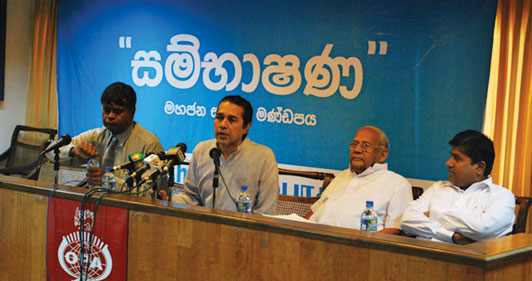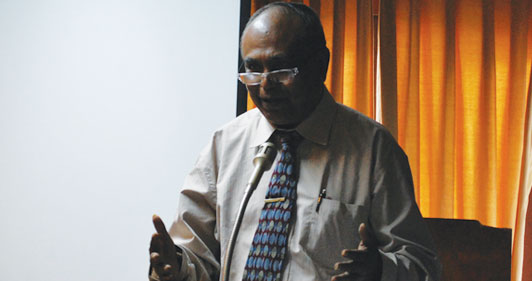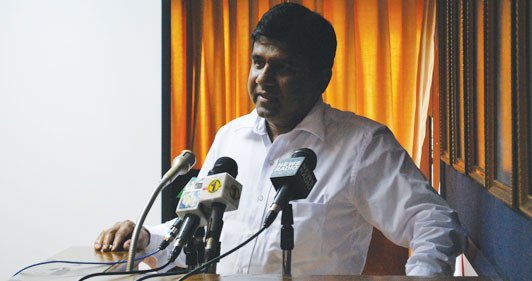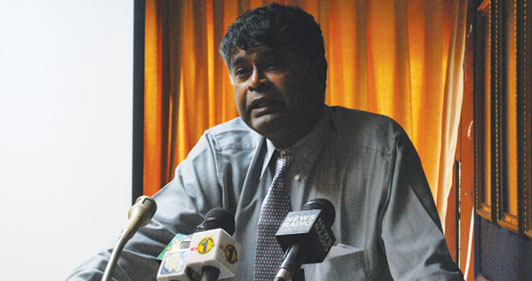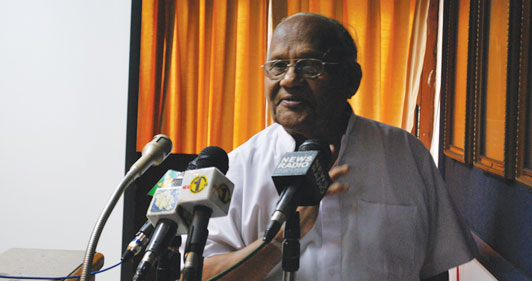‘COPE Exposure & Beyond’ was the theme of the Sambhashana Outreach Programme organised by TISL and held at the OPA auditorium on 26 January.
Taking part in the discussion were Hon Wijeyadasa Rajapakshe PC, Hon Rajiva Wijesinha and Professor A V de S Indraratne. The moderator was senior journalist Lakshman Gunasekera.
TISL Chairman M D A Harold welcomed the participants.
Opening the discussion, Hon Wijeyadasa Rajapakshe PC referred to four stages in which Parliament can exercise control over public finance. One is at the time of presenting the Budget when an opportunity is given to participate in the debate, defeat or pass it. At the Consultative Committee level too there is an opportunity to critically look at public finance. Questions in relation to ministerial expenditure can be posed to Ministers and fourthly a post-mortem opportunity as to how this duty was discharged is provided through the oversight committees. He pointed out that there is a practical problem in the last one when ministers have to adjust their role as MPs.
Referring to his own role as COPE chairman, he said that he inquired into 46 institutions and it was established that 16 institutions suffered from mismanagement, corruption etc; “When presenting the report, I took personal responsibility and said that if a comma or a word is challenged, I would leave Parliament. Nobody challenged the contents, and a resolution was adopted by parliament that the report was correct and its recommendations should be implemented,” he said.
He added that the report also identified ministers who had been recognised as being corrupt. COPE also wrote to CIABOC to indict wrongdoers ranging from ministers, ministry secretaries and other public officials. Retired officials were also sent for and those who were overseas were issued with summons.”It is possible to be proactive in this regard’, he pointed out.
“I paid a huge price for the stance adopted and for pushing for a pubic-interest agenda.” Hon Rajapakshe said.
He stressed on the need for all governments to appreciate the value of these reports since they help governments to have improved financial performance. “Citizens on the other hand, should agitate for the implementation of useful recommendations that will help improve financial performance which will have a direct bearing on all citizens”, he said.
Member of COPE, Hon Rajiv Wijesinha MP said that the most preposterous element of COPE before the current Chairman, Hon DEW Gunasekera took over was the lack of seriousness of its deliberations. “Whilst at meetings instructions were issued, absolutely nothing was done to ensure that there was follow up. I discovered this only when, after a couple of months, I began to ask about reports that we had requested. I found then that, if such material was received, it was circulated to members, but if it was not received, nothing was done,” he pointed out. He termed it as ” a nonsensical way to proceed”.
“But it was clear to me that the staff of COPE had simply no idea about basic principles of management. I therefore insisted on a system whereby schedules were prepared of what had been requested from particular institutions, and reminders sent when they failed to comply, with provision to summon them again if there were lapses,” he added.
(Full text : https://www.tisrilanka.org/?p=9229)
Professor A D V de S Indraratne said that the public sector of no country can claim to be completely or 100 per cent free of corruption and that the degree varies from country to country. “Transparency International measures this degree by what is known as the Corruption Perception Index, ranging from 10- 0, that is the least corrupt to most corrupt. Sri Lanka has been placed somewhere around 3 on this Index. Overall, Sri Lanka has been classified as a corrupt country. Let us have no debate on this. It is only a perception of an international body committed to fight corruption,” he said.
After analysing the performance of COPE, he suggested a series of reforms and commented that while these reforms are necessary, they may not be sufficient “without the political will on the part of the Legislature and the Head of State on the one hand, and active participation of an enlightened and alert Civil Society on the other”. He also stressed on the need for the system of education in the country to be revamped to instil into minds of the youth a sense of what is right and wrong with self-discipline and tolerance of the rights of others, in collaboration with parents, teachers, the clergy and the (independent) media.
(Full text: https://www.tisrilanka.org/?p=9226)

